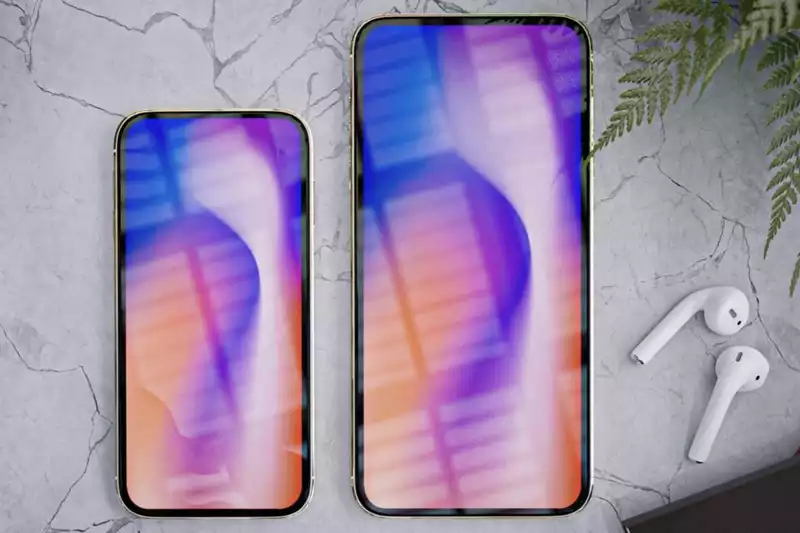The iPhone 13 is expected to be announced at the typical September launch time in 2021, and based on early rumors and leaks there is plenty of reason to get excited. Yes, the iPhone 12 is the best phone you can buy right now, but if you hear what's coming, you might decide to hold off.
For example, the iPhone 12 has trimmed off the edges and flattened the sides for a fresh look, but the notch remains the same size. And Apple is said to be finally catching up with the best Android phones with a 120Hz display in the new iPhone 13. It may also bring back a feature that makes it easier to unlock the phone when wearing a mask.
Of course, there are still a few months until the iPhone 13 is announced. But these are the seven biggest upgrades and changes we've heard so far.
The iPhone notch has been an eyesore since the launch of the iPhone X, but there is a lot of technology packed into this area, which houses the TrueDepth camera and enables Face ID. According to a leak by Ice Universe on Twitter, iPhone 13 will continue the notch design, but will be shorter.
According to another report from Digitimes, Apple will be able to reduce the size of the notch by reducing the size of the sensor that enables Face ID. In addition, the so-called VSCEL chip in the front camera should also be slimmed down, reducing its volume. Therefore, the notch will not disappear from the iPhone 13, but it should become less noticeable.
The iPhone 13 will be the first iPhone with a display with a 120 Hz refresh rate, which should enable smoother scrolling, better video playback and game play with supported content. This is according to both Apple analyst John Prosser and display analyst Ross Young.
Thanks to LTPO technology, displays should be able to scale from 120Hz to 1Hz depending on the content on the screen, which should help save battery life. However, according to The Elec, only two models will feature 120Hz LTPO displays, meaning the iPhone 13 Pro and iPhone 13 Pro Max.
A more powerful periscope zoom may not appear until the iPhone 14 in 2022, but a number of other iPhone 13 camera upgrades have been leaked and look promising. For starters, the iPhone 13 will reportedly feature an improved ultra-wide-angle lens with six elements and an f/1.8 aperture. This is an improvement over the f/2.4, 5-element lens on the iPhone 12 and should result in better low-light results.
In addition, analyst Ross Young predicts that the iPhone 13 Pro and iPhone 13 Pro Max will have larger sensors, again capturing more light. Also, according to analyst Ming-Chi Kuo, the advanced sensor-shift image stabilization found in the iPhone 12 Pro Max will be included in both the iPhone 13 Pro and iPhone 13 Pro Max.
If you have never heard of Wi-Fi 6E, you are about to. This new standard is designed to deliver even faster wireless speeds; according to a Barclays analyst report, the iPhone 13 lineup will support Wi-Fi 6E, which allows for connectivity in the 6 GHz band. This should reduce interference with other devices in the home.
In addition to higher speeds, Wi-Fi 6E should also enable lower latency, which should lead to improved performance. Additionally, Wi-Fi 6E devices can use 160 MHz for high-bandwidth activities such as augmented reality. Broadcom, which manufactures the mobile Wi-Fi 6E chip, calls the 6 GHz band "the most disruptive boon for Wi-Fi users in the past 20 years."
The iPhone 13 could be the first truly new iPhone design in years to support Touch ID. Analyst Mini-Chi Kuo claims that Apple is working on an iPhone with both Face ID and an under-display fingerprint scanner for a 2021 launch. However, this feature may be reserved for the iPhone 13 Pro and iPhone 13 Pro Max.
The analyst also states that Apple is developing an iPhone with Touch ID integrated into the power button for 2021. It is not certain whether this refers to the regular iPhone 13 or iPhone 13 mini, or the new iPhone SE 3 or iPhone SE Plus, as these are not intended for flagship devices.
The new iPad Air has a Touch ID sensor on the power button, which worked well in our tests; Face ID is incompatible with masks, and it is possible that people will still be required to wear masks in public in 2021, so bringing Touch ID back to the iPhone 13 It makes a lot of sense to bring it back.
If you have seen the iPhone 12 battery test results, you know that Apple's flagship model did not fare so well. In fact, when surfing the web, we saw a very large difference between 4G and 5G. The good news is that Apple's own documents reveal that Apple needs to upgrade from Qualcomm's 7-nanometer X55 5G modem to the newer and more efficient 5-nanometer X60 modem.
The X60 can be integrated directly into the phone's chipset, which should reduce footprint while reducing battery drain. In addition, the X60 can combine mmWave and sub-6GHz networks at the same time, allowing for faster communication.
The LiDAR sensor introduced in the iPhone 12 Pro and iPhone 12 Pro Max will enable better autofocus performance and also allow for tricks such as portraits in very dark locations. and thus better augmented reality (AR) performance.
According to Digitimes, all four iPhone 13 models should have LiDAR (or time of flight) this time around. In other words, this feature will no longer be available only on the most high-end iPhones. According to the report, the new ToF sensor will enable an "instantly immersive AR experience." We've seen some pretty cool iPhone AR apps, but nothing that could be called a must-have.
.









Comments